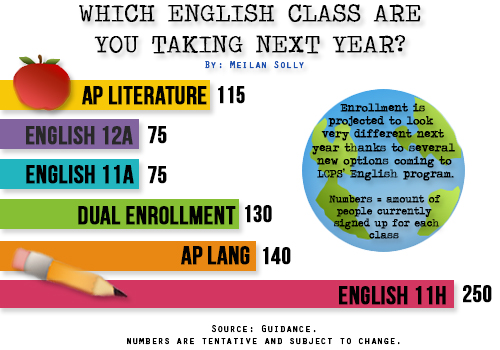By: Meilan Solly
As the end of this school year approaches, many students are looking towards the upcoming 2013-2014 year. Like years of the past, it is sure to bring new surprises and challenges such as new friends and harder classes. Unlike previous years, however, the 2013-2014 school year will offer a plethora of English options rather than the previously limited choices.
Currently, juniors take either Honors or Academic English 11, while seniors take Academic English, AP Language and Composition, or AP Literature and Composition. Next year, each grade level will have one more option. Junior offerings will be expanded to Honors English, Academic English, and AP Lang. Some current juniors take AP Lang, but they must take it in conjunction with Honors English. Next year, the need to enroll in both classes will be eliminated. As for seniors, a new Dual Enrollment English course will join Academic, AP Lang, and AP Lit as options.
Since AP Lang will now be open to juniors, Mrs. Purvis, the English Department Head, explains that “the curriculum will be adjusted so that it emphasizes American literature, since that is the main focus of 11th grade English in Loudoun County.” While this may not bode well for current juniors who have already taken American literature-based English 11 but wish to take AP Lang next year, the problem will be eliminated following the 2013-2014 year. “This is the last year rising seniors will be given the option to choose between AP Literature and AP Language. In the future, AP Language will be an 11th grade class, and AP Literature will be a 12th grade class,” Mrs. Purvis says.
AP Lang is not the only course changing; an entirely new class is being introduced. Dual Enrollment, which is offered jointly with Northern Virginia Community College, is “a way for students to receive a 0.5 GPA bump while simultaneously receiving college credit for successful completion of the class,” as Mrs. Purvis phrases it. Seniors who successfully pass the Dual Enrollment class will receive a guaranteed six hours of college credit from NVCC. Unlike the college credit requirements for AP classes, students taking Dual Enrollment do not need to pay or pass an exam in order to receive credit.
So, why were these changes made, and how will they affect students? Samantha Peppers, a junior, believes the changes are a result of the fact that “there’s currently no middle ground” in senior English courses. This is true, as juniors face a jump from either Honors to Academic or Honors to AP once they reach senior year. Mrs. Purvis confirms this, saying, “The changes are being made in order to give students more options.”
Many students are pleased to hear about the new English offerings. Lauren Short, a sophomore, is one such person. She is taking AP Lang next year because “it offers a bigger GPA weight.” Short believes the change is positive because “it’s much better for GPAs.” Josh Morrison, a junior, agrees that the changes are beneficial. “[Offering more courses] gives more options and better choices. It doesn’t force people to do something they’d be uncomfortable with,” he says.
While some sophomores are eager to get a jumpstart on their AP English classes, others are not. David Chalmers is one such sophomore. “I don’t like English,” Chalmers says. “[Taking an AP I don’t enjoy] would take too much time.” He believes, however, that the option is overall “good because kids who had high expectations but found Honors too easy can take AP next year.”
As for rising seniors, the premise of earning college credit without taking an AP exam is an exciting prospect. Mrs. Purvis adds that Dual Enrollment is “an ideal option for current juniors who are already planning to take several AP classes next year who recognize that English is not their focus.” The Guidance Department reports that an estimated 130 students are hoping to pass the enrollment test and take Dual Enrollment English. Morrison is one of them. “I don’t want to be an English major,” he says. “I’m taking enough other AP’s [without an AP English].”






